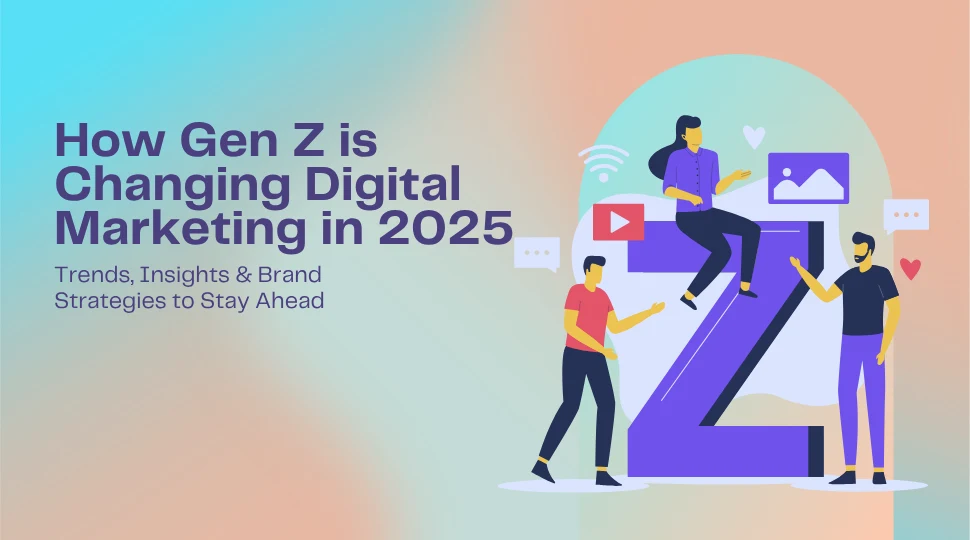Strategy + SEO Tips
How Gen Z Is Changing the Face of Digital Marketing in 2025
Table of Contents
- Introduction
- Who Is Gen Z? A Digital-First Generation
- They Crave Authenticity Over Ads
- The Power of Micro-Content
- Emotional and Native Shopping
- Purpose-Driven Brands Win
- Multi-Platform Movement
- From Follower Count to Connection
- Short-Form Learning Culture
- The Rise of Audio and Voice
- Memes as a Language
- Personalization Over Generalization
- Conclusion
- FAQs
Introduction
The marketing trends of 2025 will be updated and refined by no one other than Gen Z. Triggered between the mid-1990s and early 2010s, this group heavily relies on brand authenticity, fast content, and powered value-driven brands. Marketers are left with the option to either adapt and be at pace with their strategies or get outpaced.
Explore a more contemporary approach to development platforms by starting your digital marketing learning journey at Digital Trainee’s Digital Marketing Course in Pune, where next-generation techniques are taught in professional classes.
Who Is Gen Z? A Digital-First Generation
Social media and smartphones have defined and shaped the upbringing of Gen Z. Their habits are tracked in correlation to new-age digital marketing strategies.
- Highly tech-savvy and fast adopters of new platforms
- Prefer video, visual, and audio content
- Value speed, authenticity, and purpose
Trends such as peer rating alongsidecreators influence their purchase behaviours, as will TikTok,Instagram and YouTube.
They Crave Authenticity Over Ads
In contrast with millennials, Gen Z identifies inauthentic attempts at advertising in seconds. They prefer:
- User-generated viral material.
- Contemporary stories like “behind the scenes”
- Influencers who are relatable rather than aspirational
Gen Z Marketing Focus: storytelling complemented with raw visuals and trust-building collaborations.
The Power of Micro-Content
Focus becomes harder and harder to grasp. Gen Z strongly favours concise content with rich value propositions, a technique described as “snackable” that summarises volume into brevity.
Popular micro-content formats:
- Shorts and Reels
- TikTok videos
- Infographic and meme carousel threads
- Curation of Tweets together with threads
Adopting these elements into a content marketing strategy is essential.
Emotional and Native Shopping
Gen Z shopping behaviour is rooted in emotional connection. Native e-commerce experiences—where users buy directly from social platforms—are rising.
Key tactics:
- Shoppable posts on Instagram and TikTok
- Influencer affiliate links
- Seamless checkout within content
Native + emotional = conversion.
Purpose-Driven Brands Win
This generation cares deeply about social and environmental issues. They choose brands that align with their values.
How to win Gen Z loyalty:
- Highlight your sustainability or DEI efforts
- Be transparent about operations
- Support causes they care about
Authenticity + purpose = brand trust.
Multi-Platform Movement
Gen Z doesn’t just use one app. They shift across platforms throughout the day, often on multiple at once.
Top Platforms Gen Z Uses in 2025:
- TikTok (discovery + entertainment)
- Instagram (identity + branding)
- YouTube (learning + deep dives)
- BeReal and Threads (authentic sharing)
Your brand must meet them everywhere.
From Follower Count to Connection
Gone are the days of vanity metrics. Gen Z values connection over clout.
Focus on:
- Real engagement
- DM conversations
- Comments over likes
- Community over followers
This changes how Gen Z and social media function together—it's all about micro-influence and genuine interactions.
Short-Form Learning Culture
Gen Z learns on the go. Whether it’s a 60-second tutorial or carousel tips, short-form education is booming.
Digital marketing strategy tip:
Turn your content into value-driven educational bites.
- “3 ways to…” videos
- How-to carousels
- Quick tip posts
You’re not selling—you’re teaching to sell.
The Rise of Audio and Voice
While video dominates, audio is surging. Podcasts, voice notes, and smart speakers offer new avenues to reach Gen Z.
Voice formats gaining popularity:
- Bite-sized podcasts
- Creator voice notes
- Brand Spotify playlists
- Interactive voice ads
Voice content adds intimacy and personality.
Memes as a Language
Memes are no longer just humour—they are communication tools. Gen Z uses them to express identity, critique culture, and interact with brands.
To thrive, brands must:
- Understand meme culture
- Create or remix trending formats
- Avoid forced humor—Gen Z can tell
Memes = modern brand language.
Personalization Over Generalization
Generic campaigns don’t fly anymore. Personalised marketing for Gen Z leads to far better conversion.
Ways to personalise:
- AI-driven content suggestions
- Interactive quizzes
- Dynamic website content based on user behavior
- Personalized email flows
Gen Z expects custom, not cookie-cutter.
Conclusion
To stay relevant in 2025, brands must embrace how Gen Z is changing the face of digital marketing. From authenticity and purpose to micro-content and multi-platform strategies, Gen Z sets the new rules.
Ready to master these strategies? Enrol in Digital Trainee’s online digital marketing course and build campaigns that resonate with the next generation.
"Until the lion learns to write, every story will glorify the hunter."
- Chinua Achebe
1. Why is Gen Z important for marketers in 2025?
2. What content does Gen Z prefer?
3. How can brands build trust with Gen Z?
4. Which platforms should marketers prioritise?
5. What’s a key tip for marketing to Gen Z?
Raj Ingole
A digital marketing specialist passionate about decoding how Gen Z is reshaping the future of marketing.








